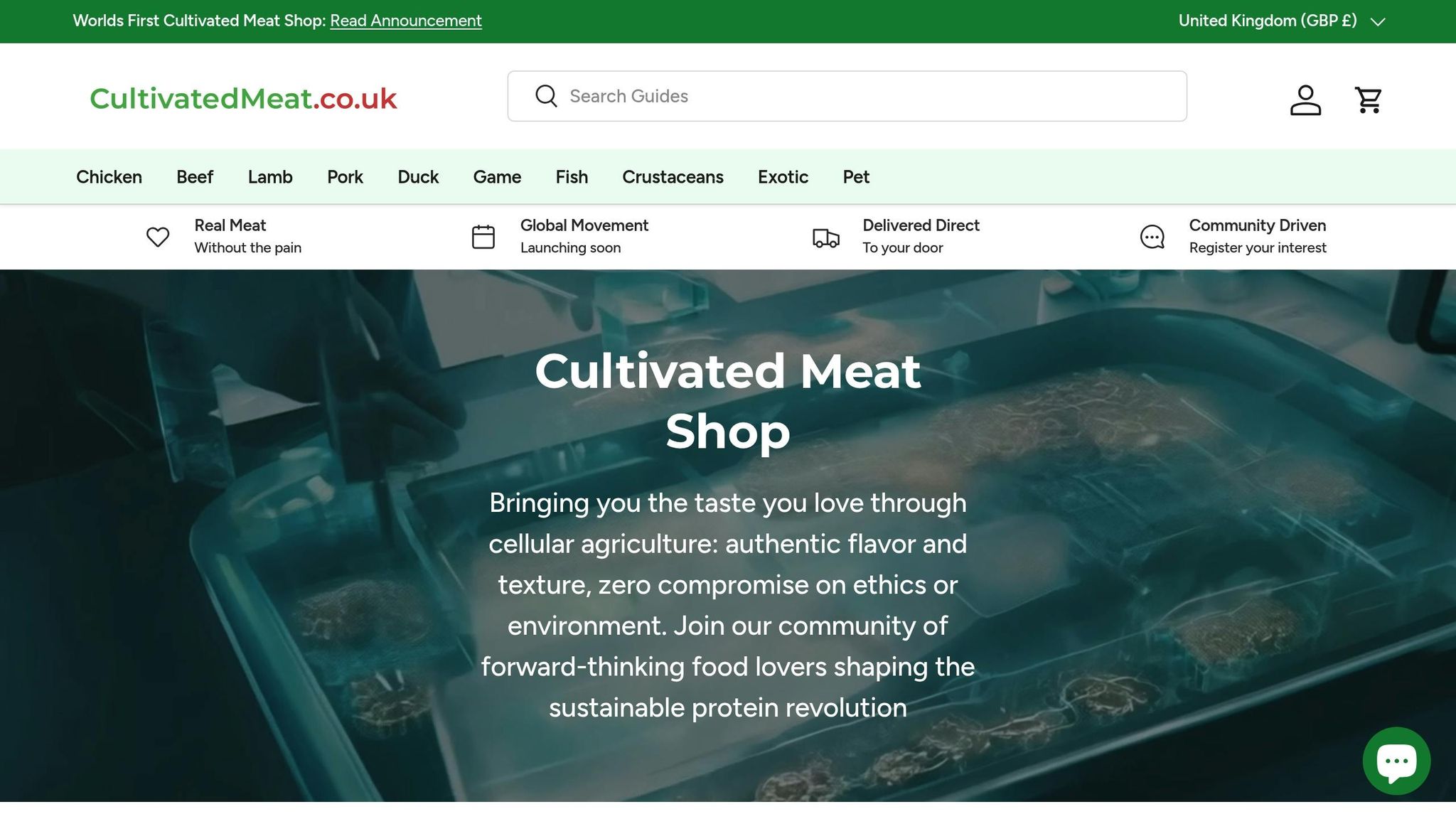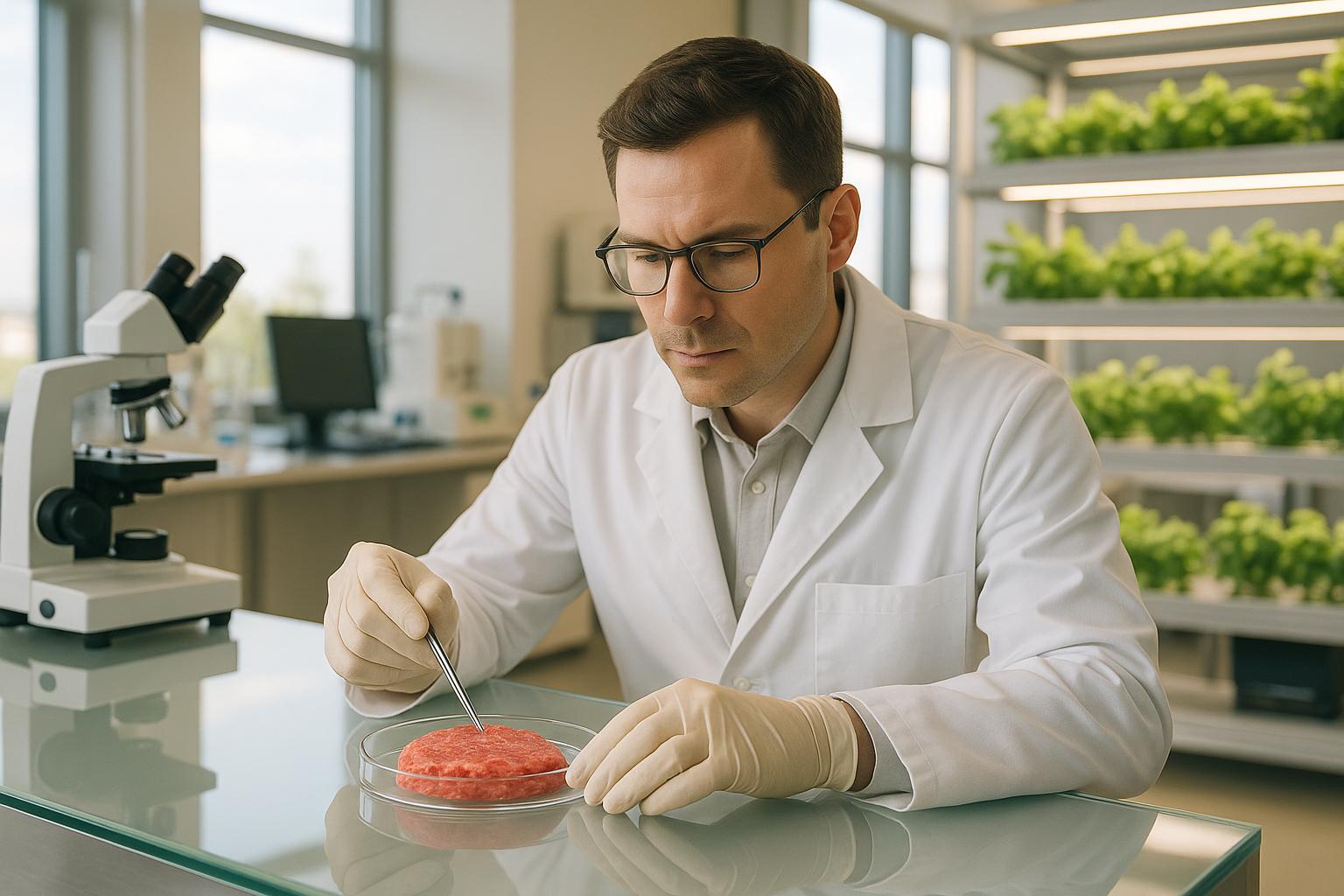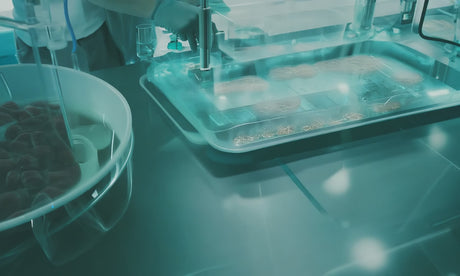The UK government has pledged £12 million to the Cellular Agriculture Manufacturing Hub (CARMA), led by the University of Bath, to scale up cultivated meat production. This initiative is part of a larger £120 million programme aimed at advancing sustainable food technologies and meeting climate goals. Key highlights include:
- What is cultivated meat? Real meat grown from animal cells, reducing the need for traditional farming.
- Why it matters: Cultivated meat could cut greenhouse gas emissions by up to 92%, use 90% less land, and significantly reduce air and water pollution.
-
Main goals of CARMA:
- Scale production from lab to commercial levels.
- Develop cost-effective cell culture media.
- Optimise bioreactor technologies.
- Address regulatory and supply chain challenges.
- Economic impact: The sector could add £2.1 billion to the UK economy and create over 16,500 jobs by 2030.
This investment positions the UK as a leader in cellular agriculture, with cultivated meat products potentially reaching supermarket shelves by 2027.
Details of the £12M Investment
As part of a larger £120 million research and development programme, this £12 million funding marks the UK's biggest single government investment in sustainable proteins. It positions Britain as a leader in the development of cellular agriculture, pushing the boundaries of innovation in cultivated meat production.
The funds are being used to establish the Cellular Agriculture Manufacturing Hub (CARMA). This initiative is designed to tackle the challenges of scaling cultivated meat production from small-scale laboratory prototypes to fully operational commercial manufacturing systems. Below, we break down how this investment is being distributed across academic institutions and industry partners.
How the Funding Will Be Distributed
The University of Bath, under the leadership of Professor Marianne Ellis, is spearheading the CARMA consortium, which is central to this initiative. Academic partners bring their expertise in fields such as bioprocess sciences, cell biology, engineering, and social sciences - key disciplines for overcoming the hurdles of scaling up cultivated meat production.
In addition to academic collaboration, the funding supports eleven commercial partners working alongside the University of Bath. Among these are companies like Qkine, which specialises in producing high-purity, animal-free growth factors and cytokines crucial for cell cultivation. Other notable partners include Veolia and Merck, as well as UK-based cultivated meat firms, all of which are contributing to the project’s success.
"We are delighted to partner with an exceptional multidisciplinary group of UK universities and industrial companies to establish the underpinning technologies and supply chain for a transformative technology with the potential to impact global sustainability and future food security."
– Dr Catherine Elton, CEO at Qkine
This collaborative approach bridges the gap between academic research and commercial application, ensuring the project’s outcomes are both scientifically robust and market-ready.
Key Development Areas
With funding now in place, the programme is focusing on solving key technical and regulatory challenges. The £12 million investment is targeting three core areas to address the obstacles of scaling up production and making cultivated meat more affordable.
Bioreactor scaling is a top priority. While current production methods are effective in small laboratory settings, they face significant hurdles when scaled to industrial levels. CARMA aims to develop new manufacturing processes that will enable large-scale production without compromising on product quality or safety.
Cell culture media optimisation is another critical focus. The growth medium, which nourishes cells during cultivation, is one of the most expensive components of production. The funding will support research into creating more affordable, food-grade alternatives that can replace costly laboratory-grade ingredients while maintaining cell growth and meat quality.
Precision fermentation technologies are also receiving significant attention. Beyond cultivated meat, the hub will explore ways to use precision fermentation to produce sustainable alternatives to palm oil, helping to tackle broader environmental issues in food production.
The investment is also being channelled into improving regulatory readiness, ensuring UK companies can efficiently navigate approval processes as their products move closer to commercialisation. Additionally, resources are being allocated to supply chain development, focusing on securing raw materials and building distribution networks capable of handling temperature-sensitive products.
"I am incredibly excited and thankful that the EPSRC have recognised the opportunities the emerging field of cellular agriculture brings to achieving net zero and addressing food security."
– Professor Marianne Ellis, Professor of BioProcess & Tissue Engineering at the University of Bath
This comprehensive approach not only addresses the technical and regulatory challenges but also considers consumer engagement and market demand. By involving stakeholders and ensuring public acceptance, the programme aims to bridge the gap between laboratory innovation and a sustainable, market-ready product. These efforts reinforce the UK's position as a global leader in cellular agriculture while paving the way for a more sustainable future.
Impact on the Cultivated Meat Industry
The UK government’s £12 million investment is set to shake up the cultivated meat industry, both within the country and on the global stage. This funding comes at a critical juncture, providing much-needed resources to tackle technical hurdles and move closer to commercial success. It’s a boost that promises to advance research, improve regulations, and ensure the industry’s long-term viability.
Driving Research and Development Forward
This investment is part of a larger £120 million programme aimed at accelerating innovation. Since 2012, UKRI has channelled £43 million into research and development, with 65% of that funding allocated between January 2022 and May 2023. The £12 million now being added aligns with the broader £2 billion National Vision for Engineering Biology, positioning cultivated meat as a key player in the UK’s biotechnology efforts.
Andrew Griffith, Minister for Science, Innovation and Research, highlights the potential of this approach:
"Engineering biology is, in many ways, the future of science: using engineering to harness the power of nature to overhaul what is possible – from the treatment of disease to how we sustainably produce food and fuel."
For the UK’s 23 cultivated meat companies - which in 2022 attracted more private investment than the rest of Europe combined - this funding reduces financial barriers, allowing them to focus on solving complex challenges. The seven-year timeline for the research hub ensures steady progress, giving scientists the breathing room to address scaling issues without the immediate pressure to turn a profit.
Strengthening the UK’s Role in Cellular Agriculture
This initiative cements the UK’s position as a major player in the alternative protein sector, ranking as Europe’s second-largest public research funder in this field. Since 2021, the government has poured £75 million into alternative protein research, fostering an environment that supports companies from the early stages of innovation all the way to commercialisation.
The UK’s regulatory framework adds another layer of competitive advantage. In March 2025, the Food Standards Agency (FSA) launched a regulatory sandbox programme, involving eight startups over two years. Participants include UK firms like Hoxton Farms, Roslin Technologies, and Uncommon Bio, alongside international players such as BlueNalu (US), Vow (Australia), Mosa Meat (The Netherlands), and Gourmey (France).
Sir Patrick Vallance, science minister, underscores the significance of this regulatory effort:
"By supporting the safe development of cell-cultivated products, we're giving businesses the confidence to innovate and accelerating the UK's position as a global leader in sustainable food production."
The sandbox aims to tackle a major bottleneck in the industry. Typically, getting approval for novel food applications costs between £350,000 and £500,000 per product and can take over two-and-a-half years. The FSA’s goal is to slash this time to just 17 months, giving companies a faster route to market.
Jeremy Coller, President of the Alternative Proteins Association, sees this as a game-changer:
"Today's announcement shows the world that the UK government is serious about supporting British innovation and attracting international investment. The UK has the potential to be at the front of the pack in Europe's projected £70 billion cultivated meat market, but only if investors know we are open for business. The creation of this sandbox is a fantastic step forward for growing British businesses."
Environmental and Economic Gains
Beyond innovation, these efforts bring tangible benefits for the environment and the economy. Research shows that cultivated meat could use up to 90% less land than traditional beef production and reduce the climate impact of meat by as much as 92%. It also has the potential to cut air pollution by 94% and water usage by 66% compared to conventional methods. These reductions are crucial as the UK works to meet its net-zero targets.
On the economic front, the cultivated meat sector could generate up to £523 million in tax revenue and add £2.1 billion to the economy by 2030. The Cellular Agriculture Market, valued at USD 226.23 million (around £178 million) in 2024, is projected to grow to USD 545.36 million (approximately £429 million) by 2030, with an annual growth rate of 15.79%.
With government backing, regulatory advancements, and increasing consumer interest, the cultivated meat industry is poised for significant growth. By reducing dependence on traditional farming and imports, it offers a more resilient and sustainable solution in a world increasingly affected by climate change and geopolitical challenges.
sbb-itb-c323ed3
The Role of Cultivated Meat Shop in Consumer Education

The UK government’s £12 million investment in cultivated meat highlights an important truth: technological progress alone isn’t enough. Public understanding plays a key role in the success of any innovation. That’s where Cultivated Meat Shop comes in. As the world’s first consumer-focused platform for this emerging industry, it’s designed to bridge the gap between scientific advancements and public awareness. This effort runs in tandem with the regulatory and technical developments already in motion.
Educating Consumers About Cultivated Meat
In the UK, knowledge about cultivated meat is surprisingly low. Research shows that fewer than 2% of consumers correctly understand what "cultured meat" actually means. Cultivated Meat Shop aims to change that by making the concept of cellular agriculture easier to grasp.
The platform explains the process in simple terms, showing how cultivated meat is real animal meat created by growing cells, rather than by raising and slaughtering animals.
"Cultivated meat is genuine animal meat that's produced by growing cells directly, rather than raising and slaughtering animals."
Using clear language and relatable food imagery, the platform breaks down complex science into digestible information. It also tackles common concerns about safety and naturalness, emphasising the rigorous production methods and regulatory checks in place. This is critical because studies show that over 25% of hesitant consumers can be convinced to try cultivated meat once they understand it’s safe.
Building a Community of Early Adopters
Cultivated Meat Shop goes beyond education by fostering a community of forward-thinking consumers who care about sustainability and innovation. With 27% of UK adults already buying plant-based meat monthly, there’s a growing appetite for alternative proteins. The platform taps into this interest, creating a base of engaged individuals ready to embrace cultivated meat when it hits the market.
David Bell, the platform’s founder, envisions a transformative future:
"It's exciting to envisage a future in which vegans can eat meat, whilst maintaining the morals around animal cruelty which first shifted my focus all those years ago."
Visitors to the site can sign up to register their interest and join a waitlist, ensuring they’ll be among the first to try these groundbreaking products.
Preparing for Commercial Availability
As it builds an informed and enthusiastic community, Cultivated Meat Shop is positioning itself as the go-to destination for UK consumers to access cultivated meat. The platform is not just about education - it’s laying the groundwork for the commercial launch of these products.
Consumer interest looks promising. A 2022 study by the UK Food Standards Agency revealed that one-third of UK consumers are willing to try cultivated meat, with sustainability cited as the top motivator. When the process behind the technology was explained, support jumped to 45%, with 20% saying they’d even purchase it.
To make the transition smoother, the platform also offers practical resources, such as guides on how to cook and store cultivated meat. This ensures that when the products become available, consumers will feel confident and ready to incorporate them into their meals.
The Future of Cultivated Meat in the UK
The UK is stepping into a new era of food production with a £12 million investment aimed at advancing cultivated meat technology. This funding is a major step in helping British scientists and companies scale up production, making cultivated meat a commercially viable option.
Key Highlights
The £12 million, channelled through the Cellular Agriculture Manufacturing Hub (CARMA), marks the UK government's largest single investment in alternative proteins. This initiative has the potential to add £2.1 billion to the UK economy and create over 16,500 jobs by 2030. For every £1 invested in cultivated meat, an additional £2.70 in economic activity is expected to follow.
On the environmental front, the stakes are high. Agriculture currently accounts for 11% of the UK's greenhouse gas emissions. Cultivated meat offers a promising solution to help the UK meet its climate goals, reducing the environmental impact of traditional farming.
Post-Brexit, the UK has a unique edge. The Food Standards Agency (FSA) has introduced a streamlined approval process, using a regulatory sandbox approach. This could see cultivated meat products on supermarket shelves as early as 2027. Public interest is also growing, with a third of UK consumers open to trying cultivated meat and 27% of adults buying plant-based alternatives monthly.
These factors position the UK to take significant strides in the cultivated meat industry.
What Lies Ahead
The next few years will be crucial for the UK's ambitions in cultivated meat. Efforts will focus on reducing production costs and speeding up market readiness. CARMA, led by the University of Bath and supported by institutions like the University of Birmingham and University College London, will collaborate with companies such as Hoxton Farms and Quest Meat to tackle the challenges of scaling up.
"With 9 billion mouths to feed by 2050, we need to double world food production on the same land area, using half as much energy and water. We cannot achieve that through traditional agriculture."
– George Freeman, Minister of State for Science, Research and Innovation
The regulatory landscape is becoming more accessible, thanks to the FSA's proactive approach to novel food approvals. This early engagement could fast-track the time it takes for products to reach consumers. By 2035, alternative proteins are expected to contribute £6.8 billion annually to the UK economy. Investment in European alternative protein companies also saw a 23% rise in 2024, hitting nearly €470 million.
The success of this initiative will require ongoing collaboration between government, industry, and academia.
"Ministers should use the forthcoming national food strategy as a springboard to build on the impressive work that has already taken place and develop the policy, regulatory, scientific and commercial landscape needed to accelerate protein diversification over the rest of the decade."
– Linus Pardoe, senior UK policy manager at GFI Europe
With sustained support and investment, the UK has the opportunity to lead the global charge in making cultivated meat a mainstream option, setting a powerful example for sustainable food production worldwide.
FAQs
How will the UK government’s £12 million investment in cultivated meat help meet climate goals and support environmental sustainability?
The UK government has committed £12 million to cultivated meat, a step that directly supports its climate goals and efforts to protect the environment. Compared to traditional livestock farming, cultivated meat production is far gentler on the planet, potentially slashing greenhouse gas emissions by up to 92%, using 99% less land, and consuming 82–96% less water.
This investment fits neatly into the UK’s broader push to reduce meat consumption. The Climate Change Committee has recommended cutting meat intake by 25% by 2040 and 35% by 2050. By backing advancements in sustainable protein alternatives, the UK is working to reduce its reliance on conventional farming - a significant driver of climate change - and edge closer to achieving its environmental objectives.
What challenges does the cultivated meat industry face in scaling up, and how is the CARMA hub helping to overcome them?
Scaling up the production of cultivated meat is no small feat. It’s not just about growing animal cells in bioreactors - it’s about tackling steep production costs, complex technology, and navigating strict regulatory requirements. Right now, the price of producing cultivated meat can range anywhere from £13 to an eye-watering hundreds of thousands of pounds per kilogram. On top of that, there’s a pressing need for more efficient cell lines and growth media that don’t depend on animal-derived components.
Enter the CARMA hub (Cellular Agriculture Manufacturing Hub). Backed by £12 million in funding from the UK government, CARMA is taking on these challenges head-on. Its focus? Developing cutting-edge manufacturing technologies like precision fermentation and new bioprocessing methods. By working closely with scientists and industry leaders, CARMA aims to bring costs down and make large-scale production a reality. The ultimate goal is to create a sustainable, scalable model for cultivated meat production right here in the UK.
How will the UK's regulatory sandbox speed up approvals for cultivated meat products?
The UK's regulatory sandbox programme for cultivated meat is designed to speed up product approvals by fostering collaboration among companies, regulators, and scientists. With a funding boost of £1.6 million, the initiative supports businesses in navigating complex processes like safety standards, hygiene protocols, and labelling requirements more effectively. This approach significantly cuts down the time and costs traditionally involved in gaining approval - currently a process that can stretch beyond two years.
By simplifying these procedures and tackling delays at the Food Standards Agency, the sandbox aims to bring cultivated meat products to the UK market faster. This not only encourages innovation but also enhances consumer access to sustainable protein alternatives.












